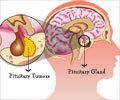
Designation Recognizes Surgical Skills and Coordinated Care for Pituitary TumorsTumors of the pituitary gland, located directly under the brain in the skull base, pose difficult challenges in both diagnosis and treatment. Known as the body's "master gland," the pituitary produces hormones that control a wide range of bodily functions. In recent years, studies have shown that pituitary adenomas and other related tumors are more common than previously thought—affecting perhaps 1 out of 1,000 people. These tumors can lead to conditions of hormonal excess such as acromegaly, Cushing's disease and prolactinoma, as well as hormonal loss, visual loss and headaches.
The idea of a CoE designation reflects specialized skills and expertise needed to provide top-level care for patients with particular types of problems. Perhaps the best-known example is the designation of level I to IV trauma centers, based on criteria such as the volume of severely injured patients treated, levels of specialist staffing, and the presence of educational and outreach programs.
The authors believe it's time for a similar approach to identifying hospitals and medical centers with the capacity to provide optimal clinical management for patients with pituitary tumors. Care is best provided in a "multidisciplinary collaborative environment," including neurosurgeons and endocrinologists with special experience in managing pituitary disorders. The treatment team should also include a wide range of other medical and surgical subspecialists who play important roles in managing these complex cases, such as neuro-ophthalmologists, radiation oncologists and otolaryngologists (ENT).
The call for a CoE designation reflects the rapid evolution of highly specialized surgical techniques for pituitary tumors, known as transsphenoidal surgery, increasingly performed with endoscopy, as well as new medical approaches to treating the hormonal abnormalities these tumors can produce. Advances in radiology and pathology have also raised the standard of skills needed for diagnosis and management.
As with other advanced surgical procedures, studies have shown that centers performing a larger volume of transsphenoidal surgeries achieve better outcomes with lower complication rates. Such high levels of volume and expertise are also essential for training the next generation of pituitary surgeons, who may not be getting the experience they need at some residency programs.
Advertisement
- Providing comprehensive care and support to patients with pituitary disorders.
- Providing residency training, fellowship training, and/or continuing medical education in the management of pituitary and neuroendocrine disease.
- Contributing to research in pituitary disorders.
The authors acknowledge that many questions remain to be answered, such as what organization would oversee the effort and how to ensure that expertise is adequately distributed across regions. As time goes on, it will be important to show that pituitary centers of excellence are truly effective in improving patient outcomes and reducing health care costs. They conclude, "Such an effort would enhance patient care, increase public awareness, promote training and expertise, and advance research in the management of pituitary tumors and related hormonal disorders."
Advertisement










